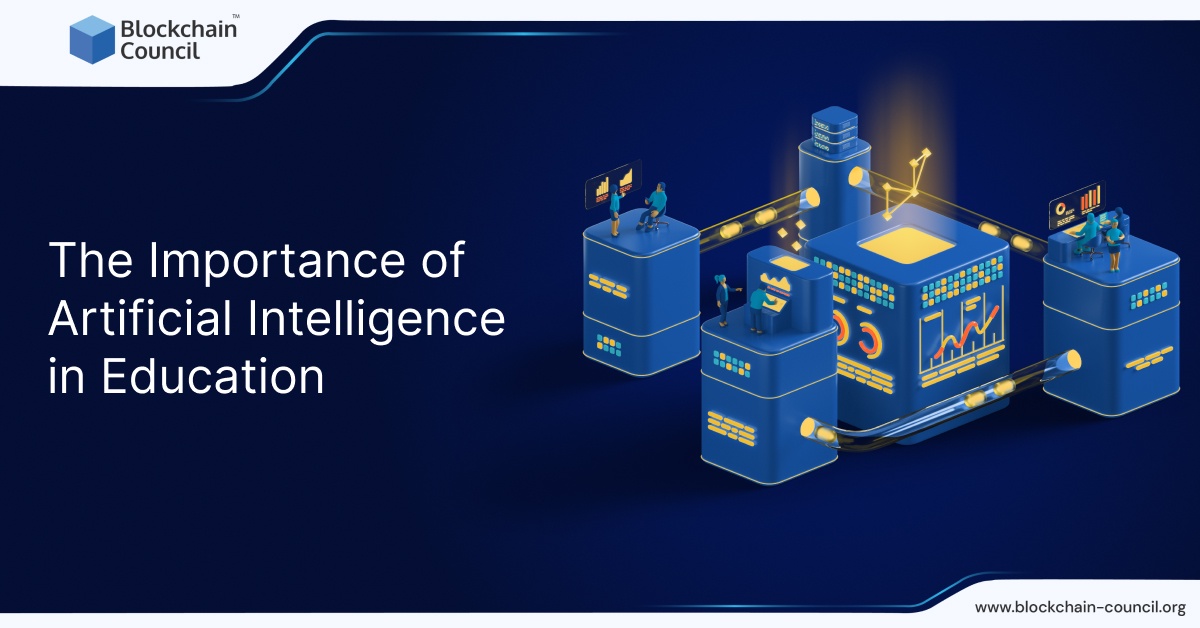Artificial intelligence (AI) is increasingly becoming a vital part of our daily lives, revolutionizing businesses and reshaping the way we work, study, and interact with the introduction of ChatGPT, Google Bard, Midjourney, and Canva’s magic features. This rapid technological growth emphasizes the significance of embedding AI education into the curriculum not just to guarantee that all students are well-prepared for their academic prospects, but also for employment development.
AI technologies have the potential to transform traditional teaching methods, making education accessible, engaging, and personalized for all students. To better understand the concept of AI, freshers and professionals are enrolling in AI certification programs. These programs will not only enhance their knowledge but will also provide better career options.
Keeping this in mind, it is critical to examine underrepresented demographics, as these students are frequently left out of the most recent technology breakthroughs. This article delves into the significance of AI in education and explores its benefits in fostering inclusive and effective learning environments.
Enhancing Personalized Learning
Every student has unique learning preferences, strengths, and weaknesses. Traditional educational approaches often struggle to cater to individual needs effectively. However, AI can transform the educational landscape by providing personalized learning experiences. By analyzing vast amounts of data, AI algorithms can identify individual learning patterns and adapt instructional strategies accordingly.
Intelligent tutoring systems can present content in a customized manner, pacing lessons based on a student's progress and adjusting difficulty levels to maintain engagement and challenge. This tailored approach to learning promotes student-centric education, enhancing understanding and knowledge retention. Furthermore, AI can provide immediate feedback on assignments and assessments, allowing students to identify areas of improvement and refine their skills.
Enabling Intelligent Tutoring
AI-powered intelligent tutoring systems can provide students with on-demand support, resembling the role of a human tutor. These systems use natural language processing and machine learning techniques to understand students' questions and offer real-time assistance. Intelligent tutoring systems can analyze students' misconceptions, offer hints, and provide step-by-step explanations, helping students overcome challenges and deepen their understanding. Moreover, AI-powered tutors are available 24/7, ensuring students have access to learning support beyond the confines of a physical classroom.
Supporting Data-Driven Decision Making
AI technologies can analyze vast educational datasets to generate actionable insights, empowering educators and policymakers to make informed decisions. By collecting and analyzing student performance data, AI algorithms can identify patterns, trends, and gaps in learning. This data-driven approach allows educators to adjust their teaching strategies, identify at-risk students, and provide targeted interventions. Furthermore, AI can facilitate predictive analytics, helping educators anticipate students' needs and develop proactive measures to enhance learning outcomes.
Fostering Inclusion and Accessibility
Fostering inclusion and accessibility, artificial intelligence (AI) has the power to bridge educational gaps and provide equal opportunities for all students, irrespective of their backgrounds or learning abilities. Students with disabilities can greatly benefit from AI-powered assistive technologies that offer real-time speech-to-text transcription, text-to-speech conversion, and personalized visual aids.
These tools enable them to actively participate in the learning process, ensuring they have equal access to educational content. Furthermore, AI-powered language translation tools can support students who speak different languages, promoting a multicultural and inclusive learning environment where language barriers are minimized. By leveraging AI, educational institutions can create an inclusive space that caters to the diverse needs of all students, empowering them to thrive and succeed academically.
Promoting Collaborative Learning
AI technologies play a crucial role in facilitating students' teamwork and problem-solving abilities. By creating intelligent platforms, AI can analyze students' collaborative interactions, offering valuable feedback on their teamwork and communication skills. Additionally, AI can enable virtual collaborative environments, bringing together students from diverse geographic locations.
This virtual collaboration not only encourages cross-cultural exchange but also broadens students' perspectives by exposing them to different ideas and approaches. With AI-powered tools, students can work together, share ideas, and collectively solve problems, fostering a collaborative learning environment that enhances their learning outcomes and prepares them for collaborative work in the future.
Developing Future-Ready Skills
In an era of rapid technological advancements, it is crucial for students to develop skills that prepare them for the future job market. AI plays a vital role in equipping students with these necessary skills. By incorporating AI education programs and tools like an AI chatbot into the curriculum, students gain hands-on experience in problem-solving, critical thinking, data analysis, and computational thinking. These skills are highly sought after in the digital age and are essential for success in various fields. Additionally, exposure to AI technologies allows students to understand the ethical implications and challenges associated with AI, fostering responsible use and decision-making.
Ethical Considerations and Challenges
The integration of AI in education brings about ethical considerations and challenges that require careful attention. Data privacy and security become paramount, as student information is collected and processed by AI systems. It is essential to establish robust protocols and safeguards to protect sensitive data from unauthorized access or misuse. Additionally, the risk of algorithmic bias needs to be addressed to ensure fair and unbiased outcomes.
Developers must strive to eliminate any biases embedded in AI algorithms that could perpetuate discrimination or disadvantage, certain student groups. Furthermore, maintaining human oversight is crucial to ensure that AI systems are used responsibly and appropriately. Educators and policymakers must collaborate to establish clear guidelines and regulations that promote the ethical use of AI in educational settings, safeguarding student privacy and ensuring equitable outcomes for all learners.
Conclusion
In conclusion, the importance of artificial intelligence in education for all students cannot be overstated. AI has the potential to revolutionize the educational landscape by providing personalized learning experiences, enabling intelligent tutoring, supporting data-driven decision-making, fostering inclusion and accessibility, promoting collaborative learning, and developing future-ready skills. However, ethical considerations and challenges such as data privacy, algorithmic bias, and human oversight must be addressed to ensure the responsible use of AI in education.
By embracing AI and leveraging its capabilities, we can create a future where education is accessible, engaging, and tailored to the needs of every student, ultimately preparing them for success in the digital age. If you are looking for online chatbot certification courses, then check out Blockchain Council’s website for the available certification programs.


No comments yet